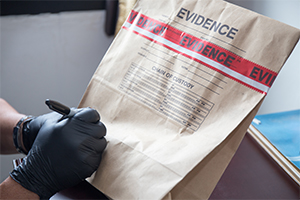Evidence For Pro Se Litigants
 One of the most confusing aspects of courtroom proceedings for pro se litigants is how to present and admit evidence. Many pro se litigants have a good instinct for what is right and wrong, and perhaps even a sound basis of legal theories. However, establishing facts and proving legal theories in court is a more complicated matter. Facts and legal theories are proven in court through the presentation of evidence. There is a saying that in court it does not matter what happened, it only matters what can be proven. There are rules for admitting evidence in court that are technical, and nothing in our everyday lives prepares us to convince other people what happened by using the formal rules of evidence.
One of the most confusing aspects of courtroom proceedings for pro se litigants is how to present and admit evidence. Many pro se litigants have a good instinct for what is right and wrong, and perhaps even a sound basis of legal theories. However, establishing facts and proving legal theories in court is a more complicated matter. Facts and legal theories are proven in court through the presentation of evidence. There is a saying that in court it does not matter what happened, it only matters what can be proven. There are rules for admitting evidence in court that are technical, and nothing in our everyday lives prepares us to convince other people what happened by using the formal rules of evidence.
Take for example exhibits. What are they? They are often your documentary evidence marked so that all in the courtroom can know what document you are discussing. There could also be other types of evidence, such as an article of clothing that might establish something relevant to the case. Only relevant and reliable evidence will be admitted in court.
As a pro se litigant, you should gather together all documents that can help you prove your case when preparing for your hearing or trial. The nature of these documents will vary from case to case. Some courts require that exhibits be “marked for identification” before the court proceeding starts. This means that you should mark the exhibit so that when you are discussing it, the court and the other party know what document you are discussing. The Plaintiff usually uses numbers and the Respondent letters. If you ultimately ask the court to enter the exhibit as evidence, which is a second step, then the exhibit will be entered with the number already on it. Often with regards to documents, a copy is introduced rather than the original.
If your exhibit is marked for identification and you would like to introduce it into evidence, you will introduce it through a witness who can identify the exhibit. You will show it to the witness and ask some questions to authenticate it. For example, a basic foundational framework is:
- Do you recognize this?
- What is it?
- How do you recognize it?
- Is it a fair and accurate representation of (whatever it is)?
As a pro se litigant, you should always check the state and local rules of civil procedure and your judge’s individual rules. If you are in federal court, you should consult the federal and local rules of civil procedure and your local judge’s rules. The rules of civil procedure tell you what procedures to follow in court and provide timelines for those procedures, such as filing petitions, motions and responses and providing the other party with your filings. Unfortunately, rules are not always crystal clear and relevant rules may not always be located just in one place. It may be helpful to consult with an attorney for coaching in the proper court procedures.
General Courtroom TipsA few general tips while in a courtroom:
- Ask the court for permission to approach a witness before showing a document
- Direct your questions and remarks to the judge rather than to the other party
- Demonstrate your best demeanor though you are in a difficult situation and are likely to feel stressed
- If the other party asks a question that is not appropriate or is harassing, you can object to the question by saying “I object”
- Courtroom proceedings are public so there may be people attending whom you don’t know
- You can stipulate (agree) to the admission of evidence with the other party, which eliminates the need to lay a foundation or authenticate it and saves time in court
Although everyone has a right to represent themselves, the admission of evidence can be much more technical than is apparent. If you can not afford the assistance of counsel, then you can seek limited assistance from an attorney, such as coaching, to help you represent yourself. If you are looking for a self-represented litigant coach in Cherry Creek or Aurora, Janko Family Law Solutions understands the needs of self-represented litigants.
 Janko Family Law Solutions Home
Janko Family Law Solutions Home

